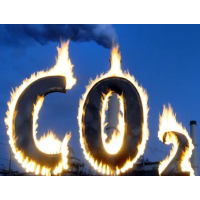Utah Wants to Send Trainloads of Coal to California Ports
 Greenpeace demonstration in 2008. (photo: Theo Heimann, Agence France-Presse/Getty Images)
Greenpeace demonstration in 2008. (photo: Theo Heimann, Agence France-Presse/Getty Images)
California, a leader in global efforts to reduce reliance on fossil fuels, is about to be asked to facilitate the shipment of Utah coal to Asian markets where clean air isn’t a big deal.
Utah’s Community Impact Fund Board signed off on a decision earlier this month to invest $53 million in an Oakland shipping terminal nearing construction for the purpose of securing leased space for their coal. Environmentalists are not happy at the prospect, but the terminal’s project manager said there’s nothing they can do about it.
“We know Oakland doesn't want coal coming through the city,” Jess Dervin-Ackerman, of the San Francisco Bay Chapter of the Sierra Club, told the Oakland Tribune. “We're ramping down the use of coal in the U.S. because we recognize it's a horrible source of pollution, and it contributes to climate change.”
Project developer Phil Tagami said it doesn’t matter: “We are entitled to have a bulk commodities terminal, and beyond that it's up to the market to determine what we export.” The deal is still being negotiated. Utah mines around 16 million tons of coal a year, and wants the ship 4 to 5 million tons of that by rail to Oakland.
Utah is looking for markets outside the United States for its coal industry, which ranks 14th out of about 25 coal-producing states. New carbon emissions regulations from the U.S. Environmental Protection Agency (EPA) are aimed squarely at pressuring power plants to not burn coal and have fueled a transition to natural gas and renewable energy sources.
Coal generates 40% of the nation’s electricity. The U.S. coal reserves are one and a half times larger than No. 2 Russia and double that of China. Coal-fired power plants are the largest contributors to the atmospheric CO2 concentrations, emitting more than twice the pounds of CO2 of natural gas.
While the U.S. Court of Appeals in Washington, D.C., ponders the constitutionality of the EPA’s regulatory extension of the 1970 Clean Air Act, states are looking for export options. “Indonesia, Thailand and Vietnam are in the top three in terms of per capita utilization of coal and they are doing that to enhance their quality of life and they are going to continue to do that so they can get affordable power to the masses,” Laura Nelson, director of Utah’s Office of Energy Development, told the Deseret News.
Coal exports have more than doubled since 2005, with the overwhelming bulk of it going through East Coast and Gulf ports. California had around 1.4% of the traffic (pdf) in 2011. Coal is a big moneymaker for the Port of Long Beach and Stockton’s coal roots are said to go back 80 years.
But efforts to expand coal exports have met some official resistance. In February 2014, the Port of Oakland Board of Commissioners rejected a proposal to build a new coal and coke export facility at the Charles P. Howard Terminal. Beyond the noxiousness of contributing to the creation of fossil-fuel pollution worldwide, Oakland residents are fearful of the coal dust and diesel particulate matter sure to blow around the region as open top mile-long trains snake through the Bay Area.
Jeremy Nichols, climate and energy program director for WildEarth Guardians, told the newspaper he was not happy at the prospect of any deal that props up the Utah coal industry: “It is a bad deal for Utah public land, it is a bad deal for our climate and it is not where we need to be going.”
But Utah environmentalists don’t expect the Obama Administration to help scuttle it. A group of them filed an appeal (pdf) last week to block an administration proposal to auction off millions of tons of coal beneath central Utah's national forests.
“While President Obama is calling for action to combat climate change, his Administration seems to be doing everything they can to appease the coal industry and open the door for more carbon pollution,” Nichols said last week.
California lawmakers passed a joint resolution in 2012 urging the President of the United States to restrict the transshipment of coal for waterborne export to any nation that does not adopt regulations for greenhouse gases or other hazardous emissions at least as strict as the U.S.
That didn’t happen.
–Ken Broder
To Learn More:
Utah Coal: California, Here It Comes—and Not Everyone Is Happy (by Brian Maffly, The Salt Lake Tribune)
Unlikely Partners: Utah Investing $53 Million to Export Coal Through Oakland Port (by Doug Oakley, Oakland Tribune)
Utah Invests $53 Million in California Port for Coal, Other Exports (by Amy Joi O'Donoghue, Deseret News)
Coal Trains Coming to California (by RL Miller, DailyKos)
- Top Stories
- Controversies
- Where is the Money Going?
- California and the Nation
- Appointments and Resignations
- Unusual News
- Latest News
- California Forbids U.S. Immigration Agents from Pretending to be Police
- California Lawmakers Urged to Strip “Self-Dealing” Tax Board of Its Duties
- Big Oil’s Grip on California
- Santa Cruz Police See Homeland Security Betrayal in Use of Gang Roundup as Cover for Immigration Raid
- Oil Companies Face Deadline to Stop Polluting California Groundwater





